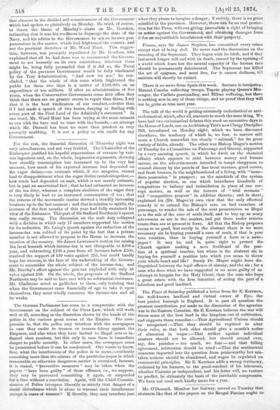For the rest, the financial discussion of Thursday night was
very miscellaneous, and not very fruitful. The Chancellor of the Exchequer justified his hopeful expectations of revenue by vari- ous ingenious and, on the whole, impressive arguments, showing how steadily consumption has increased up to the very last
moment, how much of his expected increase had depended on the sugar duties,—an estimate which, if too sanguine, cannot lead to disappointment when the sugar duties vanish altogether,— how much had depended on malt, which is not merely estimate, but in part an ascertained fact ; that he had estimated no increase of the tea duty, whereas a complete abolition of the sugar duty is very likely to lead to an increased consumption of tea ; that the returns of the mercantile marine showed a steadily increasing business up to the last moment ; and that in relation to spirits, the increase of the first months of this year had fully sustained his view of the Estimates. This part of Sir Stafford Northcote's speech was really strong. The discussion on the malt duty collapsed with a division in which only 17 members supported the motion for its reduction. Mr. Laing's speech against the reduction of the income-tax was robbed of its point by the fact that a private member is not allowed to propose to the House to increase the taxation of the country. Sir James Lawrence's motion for raising the level beneath which income-tax is not chargeable to £200 a year, and subtracting £100 a year from all incomes below £500, received the support of 139 votes against 255, but could hardly hope for success, in the face of the undertaking of the Govern- ment to reconsider the whole subject of the income-tax.; and Mr. Barclay's effort against the gun-tax exploded with only 48 votes against 258. On the whole, the proposals of Sir Stafford Northcote may be said to have met witkno substantial resistance. Mr. Gladstone acted as godfather to them, only insisting that when the Government came financially of age to take it upon themselves, they must wholly renounce the income-tax and all its works.


































 Previous page
Previous page